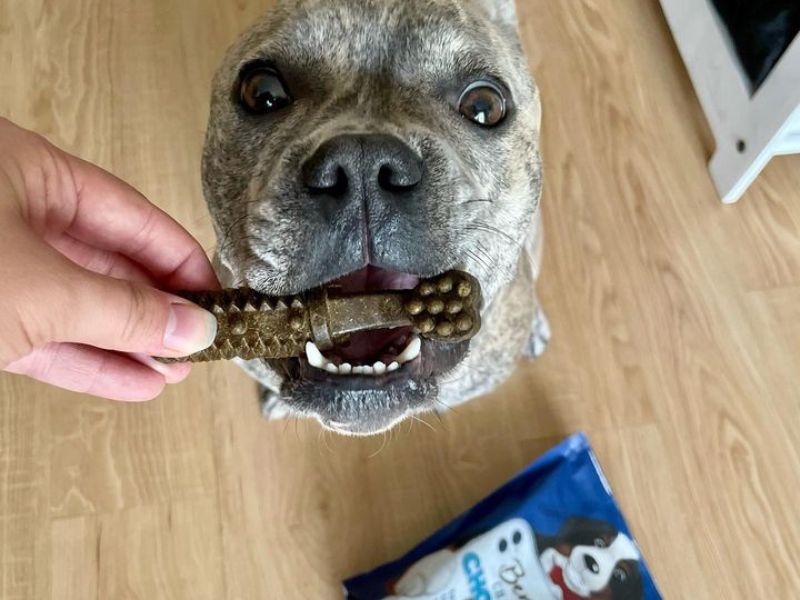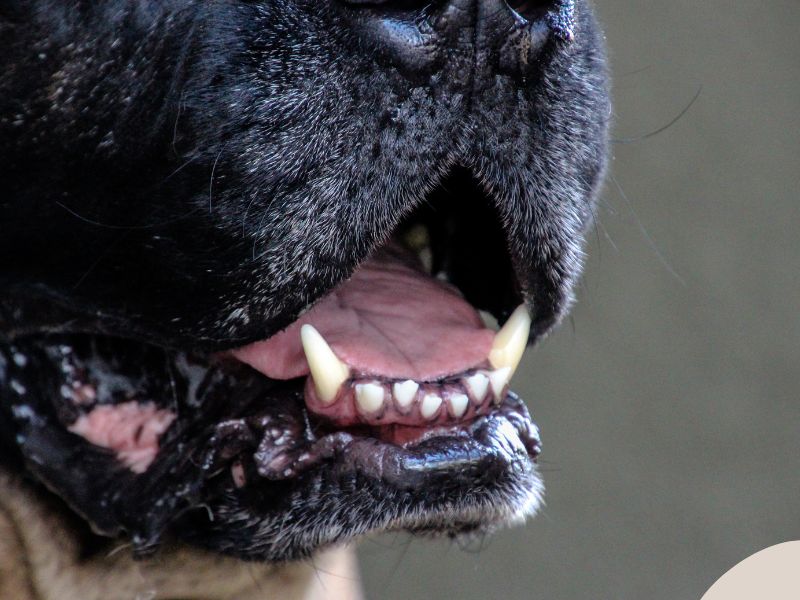Know something that’s super important but often overlooked? It’s your furry friend’s oral health. Sure, we all love those doggy kisses and want to avoid stinky breath, but did you know there’s a whole lot more to canine dental care than just getting rid of bad dog breath? Keeping your pup’s mouth healthy is a big deal and plays a huge part in their overall well-being. What makes those pearly whites and where they live so important for your dog’s health?
Inside a Dog’s Mouth: An Oral Microbiome Wonderland
A dog’s mouth is a hub of microbial activity, with different areas being home to several distinct bacterial communities.
Now…get ready for some science. Plaque in your dog’s mouth includes the Firmicutes, Bacteroidetes, and Proteobacteria. Whew. What’s cool, though, is that the mucus in your dog’s mouth and tongue also houses those bacteria, but there are larger quantities of Proteobacteria, Bacteroidetes, and Firmicutes, in that order. Your dog’s spit even has its unique microbial profile, dominated by Proteobacteria, Firmicutes, and Bacteroidetes in that order. Pretty nerdy, but neat.
And, here’s some more science you can throw around at the next game night! Other bacteria like Filifactor villosus, unclassified Pasteurellaceae, Conchiformibius sp., and unclassified Escherichia-Shigella all have their own little places in the different nooks and crannies in your dog’s mouth. The composition and abundance of these bacteria differ from one part to another.
Oral Microbiome’s Dynamic Nature
 Just like in our guts, the oral microbiome in dogs never stays the same; it evolves. Techniques like DNA amplification have helped us understand this diversity better. These studies reveal a wide range of bacteria, including those under the Bacteroidetes and Spirochaetes categories, giving us a glimpse into the complex interactions within a dog’s mouth. It’s pretty wild, actually.
Just like in our guts, the oral microbiome in dogs never stays the same; it evolves. Techniques like DNA amplification have helped us understand this diversity better. These studies reveal a wide range of bacteria, including those under the Bacteroidetes and Spirochaetes categories, giving us a glimpse into the complex interactions within a dog’s mouth. It’s pretty wild, actually.
The Oral-Gut Microbiome Connection
The oral microbiome doesn’t just stay in the mouth, though. It can have implications for the gut health of dogs as well. The bacteria in the mouth can travel down to the gut, affecting the microbiome. That means if there’s an imbalance in their oral microbiome, which is often the cause of a dog’s bad breath, it can affect their gut, too.
The gut microbiome plays a crucial role in a dog’s gastrointestinal health. It’s involved in various functions like nutrient absorption, immune modulation, and even protection against pathogens. So, any shift in the oral microbiome can potentially impact these processes. It’s all connected, and it’s all-important to take care of from the inside out.
Common Dental Issues in Dogs
But it’s not just about bad dog breath. Bad dog breath is an indicator that something more in-depth and problematic is going on. It can be a sign of internal gut health issues (as it’s strongly connected to the gut microbiome) or even issues with teeth or gums themselves. Common dental health issues include:
- Periodontal Disease: This sneaky problem is more common than you might think. It’s not just about sore gums – this disease can lead to tooth loss and other serious health issues if left unchecked. Think of it as an unwelcome guest that can cause a lot of trouble if it sticks around.
- Plaque and Tartar Build-Up: Plaque is like an annoying, clingy person who just won’t go away. If it hangs around too long (and hardens into tartar), it can lead to some not-so-fun gum disease and tooth decay.
- Canine Halitosis: Ever been greeted by your dog with a less-than-pleasant breath? This can be a sign of something more serious than just eating something smelly. Bad breath can be a clue that there’s some dental drama happening.
How To Tell If Something Is Wrong With Your Dog’s Teeth
So, how do you know if something’s not quite right when it comes to dog dental care? Keeping an eye on your dog’s oral health is like playing detective – you’re looking for clues that something might be wrong, and usually, stinky dog breath will rat it out. Still, there are other signs of oral health problems than just your dog’s breath smells.
- Sniff Test – Bad Breath Alert! Of course, if your pooch’s breath smells worse than their dog food, it’s a sign! While dog breath isn’t meant to smell like roses, overly bad breath can hint at underlying dental issues.
- Teeth Tell Tales – Look for the Unusual. Check out those chompers. Are they looking more yellow than white? Do you see any broken or loose teeth? These are signs that your dog’s dental care routine might need a reboot.
- Great Gums? Healthy gums are the backdrop of a healthy mouth. If your dog’s gums are red, swollen, or bleeding, it’s like flashing neon lights saying, “Check my oral health! Gum inflammation ahead!”
- Dinner Drama – Is Eating a Chore? If your dog suddenly turns into a picky eater or seems to have trouble chewing, it might be because of a toothache or sore gums.
- Drool Diaries – Excess Can Be a Mess. Is Fido drooling more than usual? This could be your dog’s way of saying, “Hey, something’s not right in here, and I can’t fix it myself.”
- Pawing at the Mouth – Doggy Discomfort. If your dog frequently paws at their mouth or rubs their face against the carpet, it might be because something in their mouth is bothering them.
- Behavioral Clues – Grumpy or Lethargic? Just like us, dogs can get cranky when they’re in pain. A sudden change in behavior, like being grumpy or less active, could be linked to periodontal disease and dental discomfort.
The Role of Regular Teeth Cleaning and Oral Hygiene Practices.
Just like us humans, dogs need their teeth brushed regularly. It’s the best way to fight off periodontitis and keep those chompers in tip-top shape. Dental treats, chews, and toys can be part of your dog’s daily dental care. They’re not just fun; they help scrape off plaque and tartar and even give the oral microbiota a healthier balance.
And, just like we visit the dentist, our dogs need to see their vet for regular oral check-ups. This way, any sneaky dental issues can be caught early.
Keeping your dog’s teeth gleaming and gums healthy is a long-haul journey, but it’s totally worth it. Here’s how you can be a pro at it:
- Brush, Brush, Brush: Like we said, just like you, your furry pal needs regular teeth brushing. Aim for daily, but a few times a week is still a win.
- Dental-Friendly Diet: Some dog foods are specially designed to reduce plaque and tartar buildup. Crunchy kibble can be better than soft food for dental health.
- Fresh Water Daily: Clean water is essential for washing away food particles and keeping the mouth healthy.
- Chew on This: Dental chews and toys aren’t just fun; they help clean your dog’s teeth. Think of them as toothbrushes in disguise. The best dental chews for dogs work on gut health problems as well.
Impact of Oral Health on Overall Dog Wellness
When we talk about canine oral health, it’s not just about avoiding cavities or keeping those teeth sparkling. Poor oral health can be a slippery slope, leading to more serious health issues. Periodontal disease, for instance, is not just limited to the mouth; it can have far-reaching impacts on major organs. The bacteria from dental diseases can enter the bloodstream and potentially affect the heart as well as lead to kidney or liver disease. This is a classic case of a small problem snowballing into something much bigger if left unattended, and it can be serious. Kidney disease or kidney failure from poor oral hygiene? Sadly, yes, unless you ensure your pet’s oral health is as it should be.
It’s about whole body health. A healthy mouth is like a healthy foundation for your dog’s overall wellness. Good oral health contributes to better digestion, starting in the mouth. Chewing and breaking down food effectively is crucial for proper digestion and nutrient absorption. Moreover, the immune system also gets a boost when your dog’s oral health is on point. The mouth is one of the body’s first lines of defense against bacteria and infection. Keeping it healthy means you’re keeping those guard dogs (pun intended!) active and alert.
Exploring the Canine Oral-Gut Microbiome Connection
Imagine your dog’s mouth and gut as two distinct environments, each with its own community of bacteria. While some bacteria are common to both the mouth and the gut, they can have different impacts depending on their location. When oral health slips, certain mouth bacteria may end up in the gut, where they can disrupt the gut’s bacterial harmony. This change can lead to digestive issues and inflammation, showing how closely the health of the mouth is tied to the health of the gut.
Your dog’s oral health is a key player in their overall health. Poor oral health doesn’t just stay in the mouth; it can have wider implications. When oral hygiene isn’t maintained, the resulting overgrowth of harmful bacteria can travel to the gut. Once there, these bacteria can upset the gut’s microbial balance, potentially leading to gastrointestinal problems. Issues that start in the mouth can have far-reaching effects on your dog’s overall health.
The Big Picture: Periodontal Disease
Gum disease or advanced periodontal disease in dogs is more than just an issue of bad breath or even loose or damaged teeth. The inflammation and bacteria linked to gum disease can have a systemic impact. This means that oral health problems don’t just affect the mouth; they can influence other body systems, including the gut. That’s why we promote oral health practices that don’t just treat bad breath but work from the inside out for overall well-being.
When we created Charming Chompers, we wanted to create a delicious dental chew that not only helped take away bad breath in dogs and work on preventing dental disease but also worked to promote good gut health. Dental disease doesn’t just affect the mouth, but the gut, so Charming Chompers work on keeping your pet’s mouth in great shape and their gut health too.
The oral microbiome is closely linked to their gut health, influencing and being influenced by the microbial communities in the gut. We make a different dental chew because the ingredients we use in Charming Chompers do more!
- Fiber, Prebiotics, and Postbiotics: These ingredients benefit digestive health. Fiber aids digestion and can help maintain firm stools, prebiotics support the growth of beneficial gut bacteria, and postbiotics may play a role in gut health and immune function.
- Healthy Base Ingredients:
- Sweet Potato: This is a great source of dietary fiber, which helps in digestive health and helps to keep the gut moving properly.
- Real Turkey: Dogs love it, and it provides high-quality protein that’s essential for overall health, including maintaining strong muscles.
- Pumpkin: This is another excellent source of fiber, and vets often recommend it for dogs with digestive issues.
- Yogurt: It contains additional probiotics, the good bacteria that can help balance the gut microbiome.
- Blueberries: These are packed with antioxidants and vitamins that support immune health and can contribute to a healthy inflammatory response.
We get to the root cause of oral problems, which can be linked to gut health. Our dental chews are designed to support overall wellness, not just clean teeth and fresh breath. A healthy gut can reflect better oral health, potentially reducing the risk of periodontal disease and impacting your dog’s immunity, allergies, energy levels, mood, and more!


